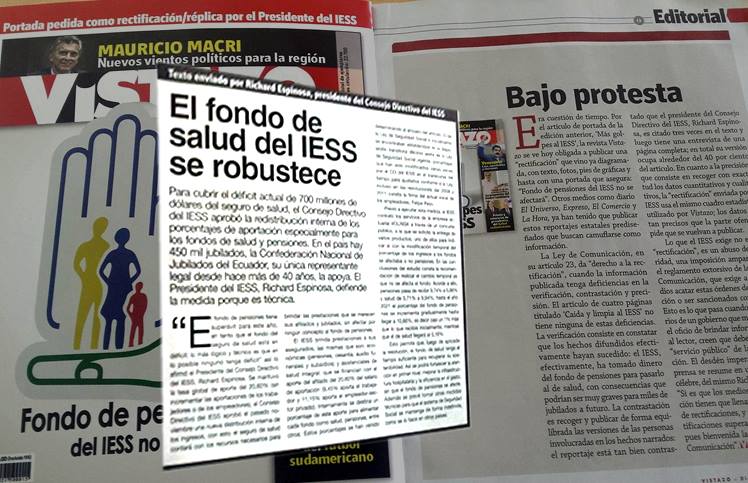ENGLISH VERSION
El 17 de diciembre, Revista Vistazo publicó bajo protesta un pedido de rectificación del presidente del consejo directivo del IESS, Richard Espinosa. El medio de comunicación dedicó su portada interior y cuatro páginas para acatar la exigencia del funcionario. Sin embargo, no dedicó su portada, como lo había pedido Espinosa quien envió los textos previamente diagramados y titulados. La revista también dedicó otras tres páginas completas de su edición No 1160 para publicar una réplica de la Secretaría Nacional de Educación Superior (Senescyt)
El pedido de rectificación que pretendía ser incluido en la portada de Vistazo bajo el título “Fondo de pensiones del IESS no se afectará” fue incluido en la portada interior, en respuesta a un reportaje titulado “Más golpes al IESS”, publicado en la edición anterior. El mismo trataba sobre las graves consecuencias que tendrían a futuro los cambios hechos al fondo de pensiones de la seguridad social. En tanto, en la página interior, además de publicarse la carta completa del funcionario, se incluyó una nota tipo reportaje titulada: “El fondo de salud del IESS se robustece”.
El medio de comunicación rechazó la intención del funcionario y aseguró que el artículo original no tiene deficiencias en la verificación, contrastación o precisión, por lo que no cabía exigir la aplicación del artículo 23 de la Ley Orgánica de Comunicación. En ese sentido, la revista afirmó que, además, en la nota original se contrastaron los hechos con la versión de Espinosa, quien aparte de ser citado tres veces en el texto se incluyó una entrevista de una página completa que, según el medio, ocupó el 40% del artículo. Por todo ello, Vistazo afirmó que “lo que el IESS exige no es una rectificación, es un abuso de autoridad, una imposición (..) Esto es lo que pasa cuando funcionarios de un gobierno que menosprecia el oficio de brindar información útil al lector, creen que deben regular el ´servicio público´ de la comunicación”. Para Espinosa, el medio de comunicación “distorsionó” la información, a pesar de que fue entrevistado por el mismo.
En cuando al pedido de réplica de la Senescyt, la revista aclaró que este se dio por la publicación del reportaje titulado “Como almas en pena por un cupo universitario” del 6 de noviembre . A criterio de la institución, la información fue difundida sin la versión del titular de esa Secretaría, quien pese a haber ofrecido telefónicamente agendar una entrevista, finalmente no contestó ese pedido.
Dicha réplica fue publicada en tres páginas completas con los titulos “Soy la primera de mi familia en ir a la universidad” y “Mayor libertad para la selección de la carrera y el lugar de estudios”. En ambos se intenta dar una realidad distinta a la expuesta por el medio de comunicación, el cual retrató los problemas de los jóvenes para obtener un cupo para estudios superiores.
Magazine publishes rectification and reply under protest in inside cover and seven pages
On 17 December, the magazine Vistazo published under protest a request for rectification by the president of the Board of Directors of the IESS, Richard Espinosa. The media outlet used its inside cover and four pages to comply with the official’s requirement. However, it did not publish the rectification on the cover, as requested by Espinosa, who had sent the text already laid out and with headlines. The magazine also dedicated another three full pages of its edition No 1160 to publish a reply by the National Secretariat for Higher Education (Senescyt).
The request for rectification which was intended to be included on Vistazo’s front page under the title «IESS pension fund will not be affected» was included on the inside cover, in response to a report titled «More blows to the IESS», published in the previous edition. The article dealt with the serious future consequences of the changes made to the social security’s pension fund. Meanwhile, in the inside page, in addition to publishing the official’s full letter, an article was also included titled: «The IESS’ health fund strengthens».
The media outlet rejected the official’s intention and stated that the original article did not suffer from deficiencies of verification, corroboration or accuracy, so the application of Article 23 of the Organic Communication Law was not required. The magazine also said that in the original article the facts were corroborated by Espinosa’s version, who as well as being quoted three times in the text, was also interviewed. This interview occupied a full page, which according to the magazine amounted to 40% of the article. All this led Vistazo to assert that «what the IESS requires is not a rectification, it is an abuse of authority, an imposition (…) This is what happens when officials of a government that despises the profession of providing useful information to the reader, believe that they should regulate the ‘public service’ of communication». Espinosa believes the media outlet «distorted» the information, despite having been interviewed by it.
As for Senescyt’s request for a reply, the magazine clarified that this was prompted by a report titled «As lost souls for a place in university» of November 6. According to the institution, the information was disseminated without including the version of the head of that Secretariat, who despite having offered by telephone to schedule an interview, finally did not answer to the request.
This reply was published in three full pages with the headlines «I am the first in my family to go to University» and «Greater freedom to select a career and where to study». Both attempt to show a different reality than the one portrayed by the media outlet, which showed the problems young people face to obtain a place in college.

